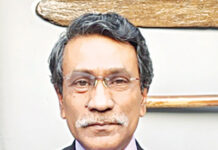BANGLADESH enacted its Right to Information Act in 2009. However more than three years following its enactment, very little is known about what the law means and what it can do to improve people’s life and governance in the country. Except for a handful of civil society groups and people, the masses remain ignorant about the existence of such a law. Additionally an important body like the Information Commission (IC) that is mandated to “increase public awareness on right to information” also remains little known across the country and can do much more to popularise the access law.
Since its passage very little information requests have been filed. This has been compounded by the fact that majority of the population live below poverty line with high illiteracy rate. It is in this context that the government can do much more by proactively disclosing information in the public domain so that the people do not have to file an information request.
Initiatives taken up by the government
Given the fact that the people are not accessing information in a manner any Freedom of Information activist wants it to be, it is heartening to know that the government has taken up some efforts to comply with the duty to make information available to the public without any request being made. The Bangladesh Government has initiated steps to set up “front desks” in the office of the various district administration to provide information relating to services and other matters to the general public. Many front desks have its own website “totho batayon” with the objective of storing and disseminating information. Several district websites have also uploaded the RTI Act 2009. Additionally Union Information Service Centres (USIC) launched in 2010 have been set up in most of the unions with the sole objective of providing the people access to basic services and providing information about agriculture, education, health, legal aid, human rights and employment.
Further the IC in collaboration with Manusher Jonno Foundation took initiatives to introduce specific mechanism for implementation of proactive disclosure in Bangladesh in 2011. They targeted three Ministries namely Ministry of Health and family Welfare; Ministry of Women and children Affairs and Ministry of Information along with attached departments/directorates so that they can develop a guideline on proactive disclosure. These ministries and their attached offices are now disclosing information through annual reports & uploading it on their websites. The Government is also gradually trying to bring other ministries under compliance of RTI Act following the guidelines already developed. However since it is three years that the RTI Act was enacted, it is time all other ministries and departments proactively start disclosing information simultaneously. The efforts made by the government are commendable but it cannot reach out to the millions living in remote places and having no access to the internet.
Provisions laid down under the Act
The kind of information that the “authorities” should disclose proactively under the Bangladesh Right to Information Act are organisational structure, decision making process, official records and updated contact details of the designated officers. Additionally if an authority frames any policy or takes any important decisions, it must publish all such policies and decisions along with reasons for support. The Act also states that all publications of authorities shall be available to the public at reasonable price and that the authorities shall publish and publicise matters of public interest through press notes or any other means. The reports that would be prepared by the public authorities shall be made available for free and its copies shall be stocked for sale at nominal price.
The Act further declares that information cannot be published or publicised if it is not stored or preserved properly and lays emphasis for preservation of information as well which ensures every authority to prepare, catalogue and index all the information. The Act underlines the fact that the information should be preserved in computer that could be accessed by maximum number of people within a reasonable time limit. In the Right to Information (Publication and Dissemination) Rules there is a clear guideline on the timeline within which the information needs to be published and the means in which it needs to be disseminated. Information unit of every department as well as the internet in every department is specifically chosen to disseminate information.
Good Practices for Proactive disclosure
While the RTI act lays down what should be proactively disclosed, however people living in far flung areas cannot access information disclosed through websites and reports. In this context, it is pertinent that the government should look into various means through which information could be disclosed taking into account easy accessibility to the public, cost effectiveness, local language and effectiveness of the various means of communication. That is to say the means of communication should keep in mind the low internet penetration and literacy level in rural Bangladesh. Some of the most effective means to reach out to maximum number of people with maximum information is through notice boards, newspapers, public announcements, media broadcasts and inspection of offices of any ‘authority’. We have to remind ourselves time and again that a large population in Bangladesh is unlettered so public announcement, union parishad meetings and direct meeting with the beneficiaries helps in imparting information. The old practice of beating a drum for attention and making an announcement in the village square is more effective than any other practice and should be encouraged even today. Penalties should be enforced to implement proactive disclosure and to prevent unnecessary delay and withholding of information. In Gujarat, India Commonwealth Human Rights Initiative along with Nagarik Adhikar Kendra used wall painting to make information known by the government widely known to the masses. This is easy, inexpensive way of providing new information and addresses the basic queries of a common man by engaging with them directly.
Proactive disclosure is not only about how to publish the information. What is crucial is what information needs to be conveyed. Merely reproducing complicated schemes or lengthy laws would defeat the spirit of the Right to Information Act and information seeker would be dejected. Information has to be made simple and also kept current. This is defiantly not a small task for any government given the volumes of information that are held by them. This takes me to the next requirement for a need of backrooms where information is stored to be well organised and readily accessible. The wave of spirit for accountability that is seen among the youths in Bangladesh makes us believe that the heart of any progressive law cannot stop beating. This can only be realised with the support of civil society, Information Commission and by the citizens filing information requests and seeking and demanding information from the government legitimately through the Bangladesh Right to Information Act.
Source: The Daily Star










